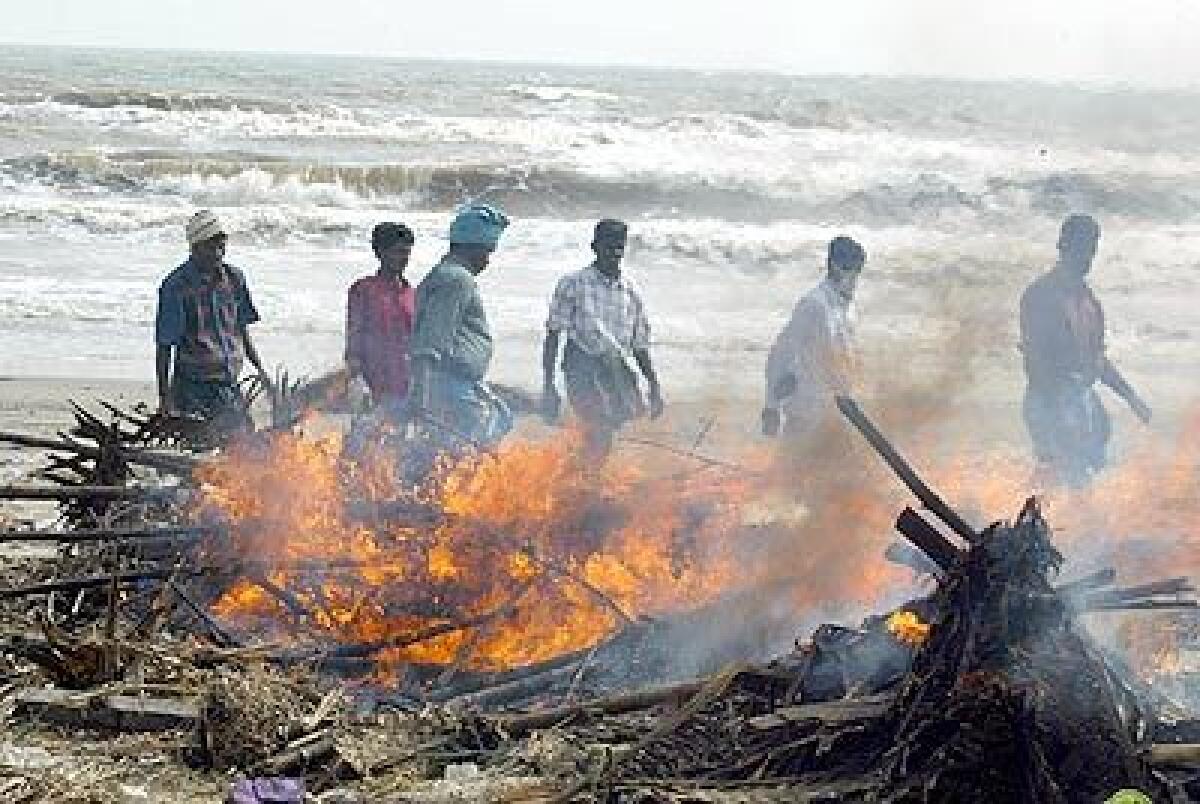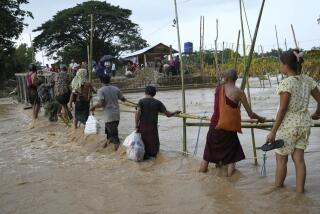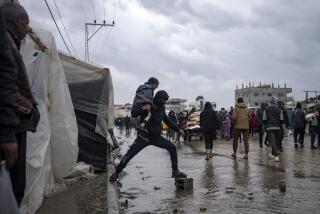Relief Efforts Quicken Amid Grief

- Share via
BANDA ACEH, Indonesia — Cargo planes carrying tons of relief supplies landed Wednesday in this wreck of a city, only to pile up at the airport for lack of trucks, gasoline and a distribution system. Half a world away, President Bush defended the U.S. response to the earthquake and tsunami that claimed at least 77,000 lives across 12 nations.
In his first public comments on Sunday’s catastrophe, Bush said from his Texas ranch: “This has been a terrible disaster. I mean, it’s just beyond our comprehension to think about how many lives have been lost.”
He pledged that the U.S. would “stand with the affected governments as they care for the victims.”
At the United Nations, a humanitarian coordinator said that the world must join together immediately to deal with one of the worst natural disasters in modern history.
“Coordination is now vital,” the U.N.’s Jan Egeland said. “The casualty number is rising by the hour.” Egeland said the organization had asked for an immediate $130 million to help the areas that were hit hardest, including Indonesia and Sri Lanka. He also said the U.N. would launch an appeal next month to raise more than $1 billion for relief.
As the International Committee of the Red Cross said Wednesday that the aggregate death toll could eventually exceed 100,000, the losses continued to climb in Sri Lanka but in smaller increments, raising hopes that the worst might be over in that country. The death toll in Sri Lanka surpassed 22,000 Wednesday.
Thousands of foreign tourists, many of whom had sought sunny beaches as a respite from Northern Europe’s dark winter, are among the missing.
Several days after the disaster, Indonesia has emerged as the nation with the greatest number of dead. Authorities put the toll at more than 45,200, but a U.N. official estimated that it could hit 80,000 once authorities reached areas that had been cut off from assistance.
Authorities said the cleanup effort was plagued by fuel shortages and the unwillingness of many residents to collect bodies for fear of finding relatives.
The first Indonesian military teams reached the city of Meulaboh on Wednesday and found what was reported as thousands of bodies. Michael Elmquist, head of the U.N. Office for the Coordination of Humanitarian Affairs in Indonesia, said that as many as 40,000 people may have died in Meulaboh, a city of about 100,000 people on Sumatra’s west coast, south of Banda Aceh. Elmquist based his estimate on an aerial survey of the city.
Confirming the worst fears for the coast, a helicopter flight by a military commander Wednesday revealed village after village covered with seawater, flattened homes and only a handful of survivors in the rubble.
“The damage is truly devastating,” Maj. Gen. Endang Suwarya said after viewing the damage by helicopter with an Associated Press reporter.
International aid and foreign doctors began trickling into the Indonesian province of Aceh as the first two Australian military cargo planes landed in Banda Aceh, the provincial capital. Little food or medical assistance appeared to have reached camps containing thousands of survivors.
The government accelerated efforts to collect rotting corpses from the debris-strewn streets of Banda Aceh, dispatching 40 trucks to pick up bodies.
Aceh has been under strict military control for 18 months as the Indonesian army battled separatists. Few outsiders have been allowed into the province, but that is changing. Dozens of foreign journalists have raced to the region. Medical teams from Singapore, Japan, Malaysia and Taiwan have arrived.
When the first Australian flight landed in Banda Aceh, Capt. John Oddie was greeted by Gen. Bambang Darmono, who is scheduled to take command of the airport this week. The Australians plan five relief flights a day.
In an unusual exchange, Oddie offered to bring in a heavy forklift and crew to unload the aid planes as well as Indonesian aircraft arriving at the military airport. The Australian also offered to bring in a medical team today. Bambang said he would consider the proposal but lacked the authority to accept the offer.
“Come back tomorrow,” he said.
At the airport, hundreds of boxes of rice, noodles and bottled water were piled up waiting to go to refugee camps, but no distribution system had been set up to deliver the goods. The officer in charge said he gave supplies to the camps that sent a truck and asked for them.
At a camp set up on the grounds of television station TVRI, about 2,000 refugees were subsisting on the small amount of food they were able to take from their homes and a meager supply of rice from the Indonesian Red Cross. Student volunteers dispensed aspirin or amoxicillin to refugees who complained of illness. The camp has no latrines.
A mile up the road at Mata Ie, a camp set up by the Indonesian military, dozens of injured refugees lay on cots in the medical tent, but there was no doctor to treat them. The smell of death hung over the hospital, where workers were starting to bury more than 500 bodies. Patients lay on cots and wooden benches in the corridors and the lobby. Bloody bandages were strewn on the dirty floor. Several patients moaned for help.
Mahmud Bakhtiar, 25, who lost 16 family members, including his father and seven brothers, suffered a broken arm when he was caught by the huge wave. Four days later, he still had not seen a doctor.
“I asked for one, but they promised nothing,” he said. “I have no idea where to go. I feel very sad. All my family, all my cousins, my nephews are dead. My arm hurts.”
Over the last two days, dozens of doctors have arrived from other parts of Indonesia and abroad to staff the facility. The hospital’s biggest problem was a shortage of fuel, said Aryono Pusponegoro, a doctor from Jakarta, the capital, who had become the hospital’s temporary administrator.
Another shortage has been caused by the desire to bury each body in a shroud, according to Muslim tradition. “That’s why we don’t have any more sheets in this hospital,” the doctor said.
In Thailand, officials said Wednesday that as many as 3,000 people, many of them foreign tourists, may have died at Khao Lak, on the country’s southern coast. More than 1,800 bodies have been recovered at the resort area, which is popular with Western and Asian tourists.
In India, officials estimate that about 12,500 people have died, though only 7,000 have been confirmed. Authorities fear that as many as 7,000 died in a cluster of more than 550 islands but they have not yet reached all those that are inhabited.
Anxious officials in Madras issued a warning today that another tsunami might hit. It was unclear what prompted the action, since only moderate aftershocks to Sunday’s quake had been recorded.
Hundreds of people who saw the televised alert began running, many away from the shore but some toward it, to see any waves that might come. Police barred access to the beach, sirens blaring.
In Sri Lanka, the body count continued to rise Wednesday as rescue workers reported 743 more deaths, lifting the nation’s official toll to 22,493, according to the National Disaster Management Center in Colombo, the capital. But the increase was far smaller than in previous days. The center also reported that 8,600 people had been injured, with several thousand missing.
Many continued to hold out hope that missing relatives would be located. “We went to look for him but didn’t find him,” said Ravindranath Thenuwara, a 32-year old ironworker who lives just south of Colombo, speaking of a missing nephew. “We hope he turns up.”
Sri Lankan Prime Minister Mahinda Rajapakse, meanwhile, told Associated Press that he had ordered the government to send aid to all affected provinces equally, including the northern region controlled by Tamil Tiger separatists.
There were reports, however, that some trucks bound for Tamil areas had been hijacked.
The Tigers’ reclusive military leader made a rare appeal for help on the movement’s Internet site. “I solicit the support and magnanimous assistance of the international community and the U.N. agencies to help our people in distress,” Velupillai Prabhakaran was quoted as saying on the TamilNet site.
Aid started to arrive in Sri Lanka in substantial quantities, government officials and aid workers said, providing some faint hope to hundreds of thousands of people left homeless, injured or grieving for loved ones.
Civic groups have provided a great deal of help, said Rangith Mudalige, director-general of the Sri Lankan Red Cross, as he juggled phone calls and staff interruptions. Teams of doctors from around the world were on the ground, as were more medicine, food and relief items.
By Wednesday, Sri Lanka had been able to truck 125 tons of supplies to affected communities. Russia and the United Arab Emirates delivered large shipments late Tuesday. The U.S. had increased its cash contribution to $2.6 million in addition to large amounts of commodities, said Chris Long, a U.S. Embassy spokesman in Colombo.
In some cases, however, aid-laden trucks were having trouble returning to Colombo for another load because of gasoline shortages in many areas.
Another major concern is the scarcity of drinking water, which at the current stage is a more urgent need than food, the Red Cross’ Mudalige said. In many areas, the tsunami inundated wells with seawater, a situation that can take months to remedy.
Around much of Sri Lanka, residents have created collection points to channel money, food and medicine to victims. The people have showed support in less tangible ways: White flags — the traditional color of mourning here and elsewhere in Asia — have sprouted on stores and lampposts and are even seen flapping from motorized rickshaws.
“We wish that all those who are dead will ascend to Nibbana,” or heaven, read a hand-lettered sheet tied to the University of Colombo’s gates.
*
Paddock reported from Banda Aceh and Magnier from Colombo. Times staff writers Maggie Farley at the United Nations, Edwin Chen in Crawford, Texas, and Paul Watson in Madras, India, contributed to this report.
More to Read
Sign up for Essential California
The most important California stories and recommendations in your inbox every morning.
You may occasionally receive promotional content from the Los Angeles Times.










